-
 Bitcoin
Bitcoin $84,705.5206
1.96% -
 Ethereum
Ethereum $1,882.8342
2.59% -
 Tether USDt
Tether USDt $0.9999
-0.02% -
 XRP
XRP $2.1020
-0.02% -
 BNB
BNB $603.8511
-0.82% -
 Solana
Solana $124.7702
-1.25% -
 USDC
USDC $0.9999
-0.01% -
 Dogecoin
Dogecoin $0.1717
1.76% -
 Cardano
Cardano $0.6717
0.25% -
 TRON
TRON $0.2380
0.73% -
 Toncoin
Toncoin $3.9856
-3.94% -
 Chainlink
Chainlink $13.7866
0.95% -
 UNUS SED LEO
UNUS SED LEO $9.4087
2.25% -
 Stellar
Stellar $0.2691
1.18% -
 Avalanche
Avalanche $19.3533
1.55% -
 Sui
Sui $2.3689
0.72% -
 Shiba Inu
Shiba Inu $0.0...01244
-1.74% -
 Hedera
Hedera $0.1666
1.40% -
 Polkadot
Polkadot $4.1088
0.73% -
 Litecoin
Litecoin $83.2182
-0.74% -
 MANTRA
MANTRA $6.2222
-1.29% -
 Bitcoin Cash
Bitcoin Cash $306.0723
0.08% -
 Bitget Token
Bitget Token $4.6091
0.13% -
 Dai
Dai $1.0000
0.02% -
 Ethena USDe
Ethena USDe $0.9999
-0.01% -
 Pi
Pi $0.6919
-3.31% -
 Hyperliquid
Hyperliquid $13.1957
-3.08% -
 Monero
Monero $219.3099
1.05% -
 Uniswap
Uniswap $6.1691
2.09% -
 Pepe
Pepe $0.0...07614
3.60%
How to earn income by staking tokens in Trust Wallet?
Staking in Trust Wallet lets you earn rewards by locking up tokens to support blockchain networks; always research tokens and risks before staking.
Mar 29, 2025 at 04:15 am
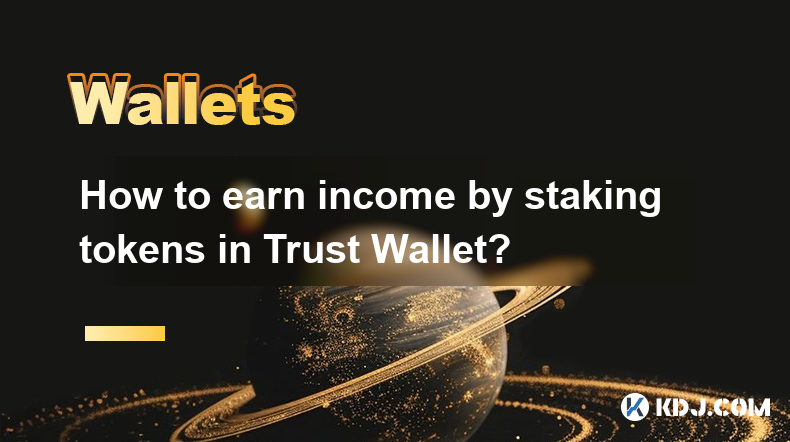
Understanding Staking in Trust Wallet
Trust Wallet, a popular mobile cryptocurrency wallet, offers a convenient way to participate in staking. Staking involves locking up your cryptocurrency tokens to support the security and operation of a blockchain network. In return, you earn rewards in the form of more tokens. This is different from lending or trading; it's about actively contributing to the network's consensus mechanism. The rewards vary greatly depending on the specific token and the network's parameters. Understanding the risks involved, such as potential impermanent loss or network changes, is crucial before starting.
Choosing Your Staking Tokens
The first step is selecting which tokens to stake. Not all tokens are stakeable. Trust Wallet supports staking for a range of tokens, but availability changes. Check the Trust Wallet app regularly for updated lists. Consider factors like the annual percentage yield (APY), the lock-up period (if any), and the token's overall market performance and reputation. Research thoroughly before committing your funds. Higher APYs often come with higher risks. Diversifying your staked assets can help mitigate potential losses.
Accessing the Staking Feature in Trust Wallet
To begin staking, open your Trust Wallet app. Navigate to the "Earn" or "Staking" section; the exact name might vary slightly depending on your app version. You should find a list of supported staking options. Ensure you're using the official Trust Wallet app and not a fraudulent imitation. Be wary of unofficial apps or websites promising exceptionally high returns, as these are often scams.
Step-by-Step Guide to Staking in Trust Wallet
- Select a Token: Choose a token from the available staking options in the Trust Wallet app. Carefully review the details of each option, including the APY and any lock-up periods.
- Check Your Balance: Ensure you have enough of the chosen token in your Trust Wallet to meet the minimum staking requirement. Minimums vary depending on the token.
- Confirm the Details: Review all the staking details one last time before proceeding. Pay close attention to the APY, lock-up period (if any), and any associated fees.
- Initiate the Staking Process: Tap the "Stake" button to begin the staking process. You'll typically need to confirm the transaction using your wallet's security features.
- Monitor Your Stake: After staking, monitor your rewards regularly through the Trust Wallet app. The frequency of reward payouts varies by token.
Understanding Rewards and Unstaking
Your staking rewards will accumulate over time. The frequency of payouts varies depending on the specific token and its network. Regularly check your balance to track your earnings. When you're ready to unstake your tokens, navigate back to the "Earn" or "Staking" section. Find your staked tokens and select the "Unstake" or "Claim Rewards" option. There might be a waiting period before you can access your tokens and rewards. This waiting period, or unbonding period, varies greatly depending on the token and network.
Security Considerations When Staking
Security is paramount when dealing with cryptocurrencies. Always use a strong and unique password for your Trust Wallet. Enable two-factor authentication (2FA) for an extra layer of security. Be extremely cautious of phishing scams and never share your seed phrase or private keys with anyone. Only use the official Trust Wallet app downloaded from reputable app stores. Avoid clicking on suspicious links or downloading apps from untrusted sources.
Risks Associated with Staking
While staking can be profitable, it's important to understand the inherent risks. The value of the staked tokens can fluctuate, potentially resulting in losses even with staking rewards. Network upgrades or changes can sometimes impact staking rewards or even lead to temporary disruptions. Never stake more than you can afford to lose. Consider diversifying your portfolio to mitigate risks. Always research the token and the network before staking.
Understanding APY and its implications
Annual Percentage Yield (APY) is a crucial factor to consider when choosing a staking option. It represents the annual return you can expect on your staked tokens. However, APY is not a guaranteed return and can fluctuate based on various factors, including network activity and market conditions. A higher APY doesn't automatically mean higher returns, and it often comes with higher risk.
Choosing the Right Validator (If Applicable)
Some staking mechanisms require you to choose a validator. Validators are nodes that maintain the blockchain network. The validator you select can affect your rewards and the security of your stake. Research validators carefully, considering their uptime, performance, and reputation within the community.
Frequently Asked Questions
Q: What are the fees associated with staking in Trust Wallet?
A: Fees vary depending on the specific token and network. Some networks charge transaction fees for staking and unstaking, while others might not. Always check the details before initiating the process.
Q: How long does it take to receive staking rewards?
A: The frequency of reward payouts varies depending on the specific token and network. Some networks pay out rewards daily, while others may pay out weekly or monthly.
Q: Can I unstake my tokens anytime?
A: Not necessarily. Many staking options have an unbonding period, a timeframe you must wait before accessing your staked tokens after initiating the unstaking process. This period varies greatly between different tokens and networks.
Q: Is staking in Trust Wallet safe?
A: Trust Wallet itself is a reputable wallet, but the security of your staked tokens also depends on the network's security and the stability of the chosen token. Always practice good security habits and diversify your investments.
Q: What happens if the value of my staked tokens decreases?
A: Even if you earn staking rewards, the overall value of your investment can still decrease if the token's price drops. Staking rewards can help offset some losses but cannot guarantee profits.
Q: Can I stake multiple tokens simultaneously?
A: Yes, you can typically stake multiple tokens simultaneously in Trust Wallet, provided each token is supported by the staking feature and you meet the minimum staking requirements for each.
Q: What if the network I'm staking on undergoes a hard fork?
A: Hard forks can impact your staking rewards, and in some cases, might even lead to temporary disruptions or loss of funds. Staying informed about the network's updates and announcements is crucial.
Disclaimer:info@kdj.com
The information provided is not trading advice. kdj.com does not assume any responsibility for any investments made based on the information provided in this article. Cryptocurrencies are highly volatile and it is highly recommended that you invest with caution after thorough research!
If you believe that the content used on this website infringes your copyright, please contact us immediately (info@kdj.com) and we will delete it promptly.
- Santiment Released Data Offering Insights for Spotting Market Dips
- 2025-04-02 11:35:12
- Have You Ever Wondered What It Would Be Like to Invest in the Next Big Meme Coin Before It Skyrockets?
- 2025-04-02 11:35:12
- Circle, the company behind the USDC stablecoin, has filed for an initial public offering and plans to list its shares on the New York Stock Exchange
- 2025-04-02 11:30:12
- Circle, the company behind USDC stablecoin, has filed for an initial public offering and plans to list on the New York Stock Exchange
- 2025-04-02 11:30:12
- Circle, the company behind the USDC stablecoin, has filed for an initial public offering and plans to list on the New York Stock Exchange.
- 2025-04-02 11:25:12
- Hyperliquid's Centralized Twist Exposes the Paradox of Decentralized Finance
- 2025-04-02 11:25:12
Related knowledge
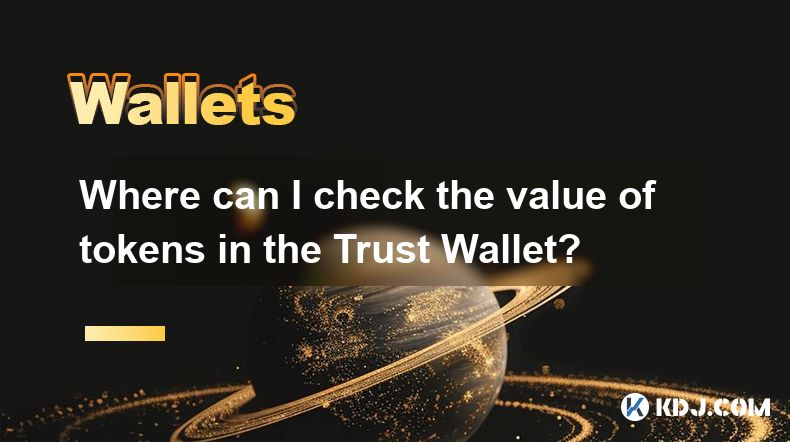
Where can I check the value of tokens in the Trust Wallet?
Apr 02,2025 at 11:14am
When using Trust Wallet, one of the most user-friendly and versatile cryptocurrency wallets available, checking the value of your tokens is a straightforward process. Trust Wallet supports a wide range of cryptocurrencies and tokens, making it a popular choice for both beginners and experienced users in the crypto space. To check the value of your token...
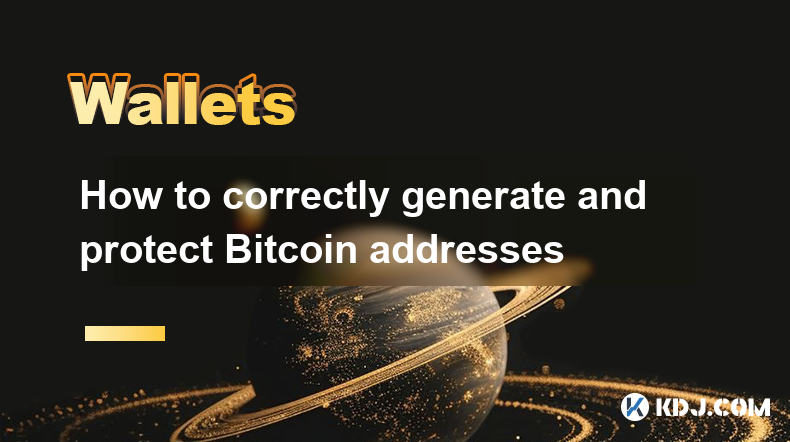
How to correctly generate and protect Bitcoin addresses
Apr 02,2025 at 06:49am
Understanding Bitcoin AddressesA Bitcoin address is like your bank account number. It's a unique identifier that allows others to send you Bitcoin. Unlike a bank account, however, Bitcoin addresses are generated cryptographically and are linked to your private keys. Losing your private keys means losing access to your Bitcoin. Therefore, generating and...
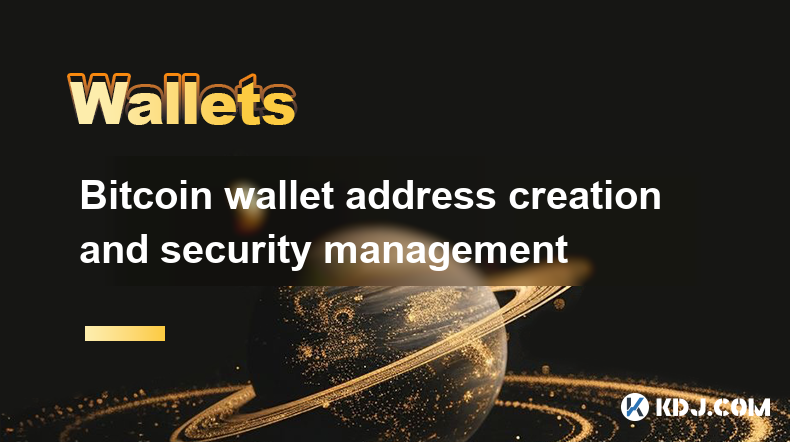
Bitcoin wallet address creation and security management
Mar 31,2025 at 10:56pm
Understanding Bitcoin Wallet AddressesA Bitcoin wallet doesn't store Bitcoin directly. Instead, it stores private keys which are long strings of characters. These keys grant access to your Bitcoin. Your public key, derived from the private key, is used to generate your Bitcoin wallet address, a unique identifier similar to a bank account number. This a...

How to easily generate a Bitcoin payment address
Mar 29,2025 at 10:49am
Generating a Bitcoin payment address might seem daunting, but it's actually quite straightforward. This process is crucial for receiving Bitcoin, as each transaction requires a unique address. Understanding how this works is fundamental to using Bitcoin effectively. This guide will walk you through the simple steps, regardless of your technical experti...
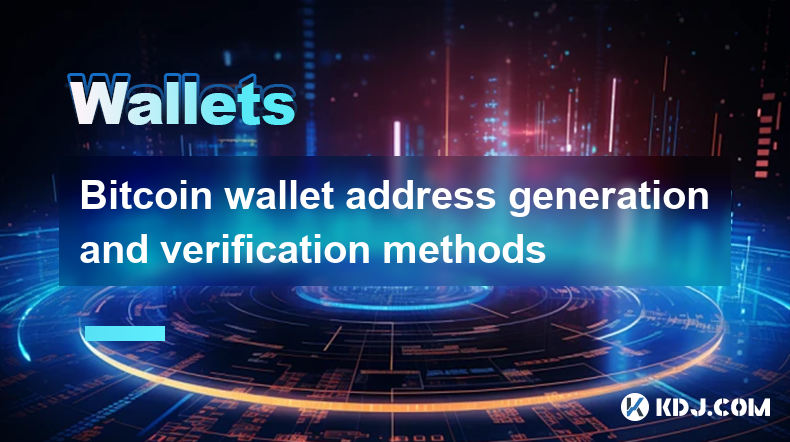
Bitcoin wallet address generation and verification methods
Apr 01,2025 at 11:01am
Understanding Bitcoin Wallet AddressesA Bitcoin wallet address is a unique identifier, similar to a bank account number, used to receive and send Bitcoin. It's a string of alphanumeric characters, crucial for participating in the Bitcoin network. Understanding how these addresses are generated and verified is paramount for secure Bitcoin transactions. ...
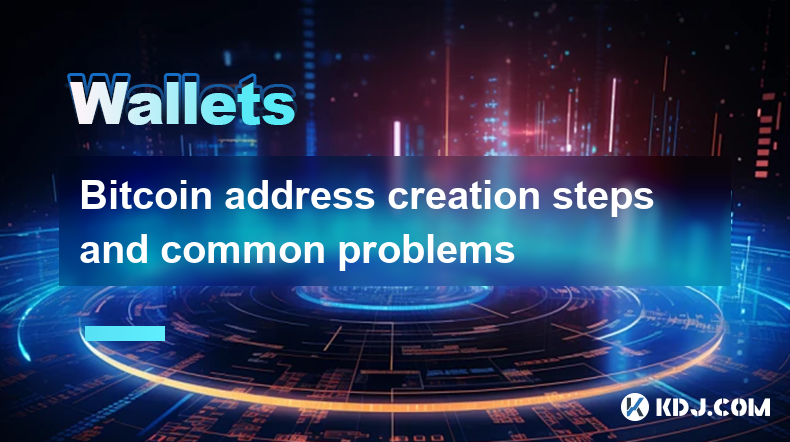
Bitcoin address creation steps and common problems
Mar 30,2025 at 06:07am
Understanding Bitcoin AddressesA Bitcoin address is a unique identifier, similar to a bank account number, used to receive Bitcoin. It's a string of alphanumeric characters generated from a public key, derived from your private key. Understanding the distinction between public and private keys is crucial for Bitcoin security. Your private key should be...

Where can I check the value of tokens in the Trust Wallet?
Apr 02,2025 at 11:14am
When using Trust Wallet, one of the most user-friendly and versatile cryptocurrency wallets available, checking the value of your tokens is a straightforward process. Trust Wallet supports a wide range of cryptocurrencies and tokens, making it a popular choice for both beginners and experienced users in the crypto space. To check the value of your token...

How to correctly generate and protect Bitcoin addresses
Apr 02,2025 at 06:49am
Understanding Bitcoin AddressesA Bitcoin address is like your bank account number. It's a unique identifier that allows others to send you Bitcoin. Unlike a bank account, however, Bitcoin addresses are generated cryptographically and are linked to your private keys. Losing your private keys means losing access to your Bitcoin. Therefore, generating and...

Bitcoin wallet address creation and security management
Mar 31,2025 at 10:56pm
Understanding Bitcoin Wallet AddressesA Bitcoin wallet doesn't store Bitcoin directly. Instead, it stores private keys which are long strings of characters. These keys grant access to your Bitcoin. Your public key, derived from the private key, is used to generate your Bitcoin wallet address, a unique identifier similar to a bank account number. This a...

How to easily generate a Bitcoin payment address
Mar 29,2025 at 10:49am
Generating a Bitcoin payment address might seem daunting, but it's actually quite straightforward. This process is crucial for receiving Bitcoin, as each transaction requires a unique address. Understanding how this works is fundamental to using Bitcoin effectively. This guide will walk you through the simple steps, regardless of your technical experti...

Bitcoin wallet address generation and verification methods
Apr 01,2025 at 11:01am
Understanding Bitcoin Wallet AddressesA Bitcoin wallet address is a unique identifier, similar to a bank account number, used to receive and send Bitcoin. It's a string of alphanumeric characters, crucial for participating in the Bitcoin network. Understanding how these addresses are generated and verified is paramount for secure Bitcoin transactions. ...

Bitcoin address creation steps and common problems
Mar 30,2025 at 06:07am
Understanding Bitcoin AddressesA Bitcoin address is a unique identifier, similar to a bank account number, used to receive Bitcoin. It's a string of alphanumeric characters generated from a public key, derived from your private key. Understanding the distinction between public and private keys is crucial for Bitcoin security. Your private key should be...
See all articles






















































































